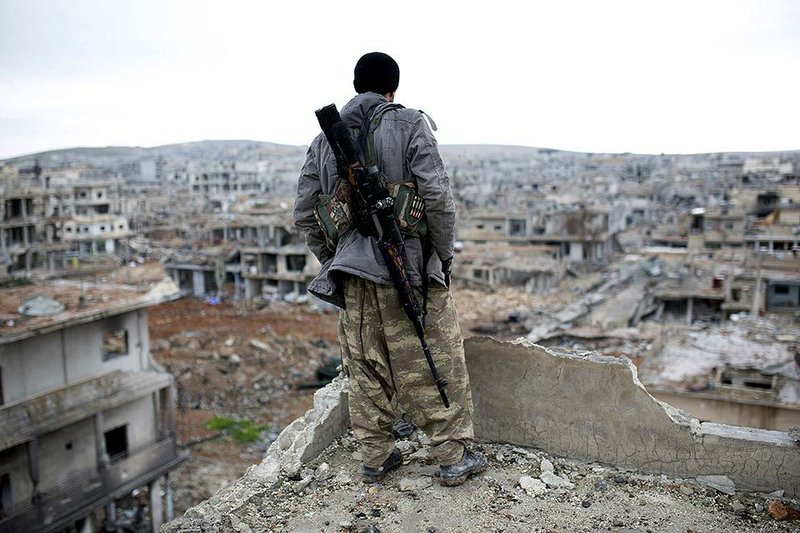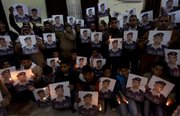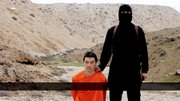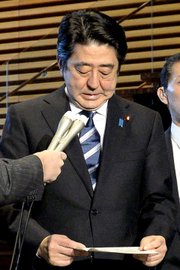TOKYO -- An online video released Saturday night purported to show an Islamic State militant beheading Japanese journalist Kenji Goto, ending days of negotiations to save the man.
Japanese Prime Minister Shinzo Abe expressed anger at the video that was released on militant websites.
"I feel indignation over this immoral and heinous act of terrorism," Abe told reporters after convening an emergency Cabinet meeting.
"When I think of the grief of his family, I am left without words," he said. "The government has been doing its utmost in responding to win his release, and we are filled with deep regrets."
He vowed that Japan will not give in to terrorism and will continue to provide humanitarian aid to countries fighting the Islamic State extremists.
Japan's defense minister, Gen Nakatani, said a report from the foreign affairs chief of Japan's police agency deemed the video "highly likely to be authentic."
"Kenji has died, and my heart is broken. Facing such a tragic death, I'm just speechless," Goto's mother, Junko Ishido, told reporters.
"I was hoping Kenji might be able to come home," said Goto's brother, Junichi Goto. "I was hoping he would return and thank everyone for his rescue, but that's impossible, and I'm bitterly disappointed."
Ishido earlier told NHK TV her son's death showed he was a kind, gentle man, trying to save another hostage.
The White House released a statement in which President Barack Obama also condemned "the heinous murder" and praised the reporting of Goto, a freelance journalist, saying he "courageously sought to convey the plight of the Syrian people to the outside world."
The White House said that while it isn't confirming the authenticity of the video itself, it has confirmed that Goto has been slain.
The video released Saturday also heightened fears for the life of a Jordanian fighter pilot also held hostage.
The fates of Goto and the Jordanian pilot, Lt. Muath al-Kaseasbeh, had been linked by the militants, but Saturday's video made no mention of the airman, according to SITE Intel Group, which monitors jihadist social media. Jordan's government spokesman, Mohammed al-Momani, declined comment. Last week, Jordan had offered to free an al-Qaida prisoner for the pilot, but a swap never moved forward.
Saturday's video, highlighted by militant sympathizers on social-media sites, bore the symbol of the Islamic State's al-Furqan media arm. The video was posted by a Twitter account associated with al-Furqan.
Though the video could not be immediately verified by The Associated Press, it conformed to other beheading videos released by the extremists.
The video, called "A Message to the Government of Japan," features a man who looks and sounds like the militant with a British accent who has taken part in other beheading videos by the Islamic State. Goto, kneeling in an orange prison jumpsuit, says nothing in the roughly one-minute-long video.
The video of Goto's apparent execution begins with the extremist brandishing a knife toward the camera, while Goto kneels and stares calmly at the camera. They appear to be in a dry stream bed.
"To the Japanese government," the killer says, "you like your foolish allies in the Satanic coalition have yet to understand that we by Allah's grace are the Islamic caliphate with authority and power. An entire army thirsty for your blood."
"Abe," the militant says in the video, referring to the Japanese prime minister, "because of your reckless decision to take part in an unwinnable war, this knife will not only slaughter Kenji, but will also carry on and cause carnage wherever your people are found. So let the nightmare for Japan begin."
He then begins cutting Goto's neck, but the screen goes black and then shows a still shot of his apparently decapitated body, hands still bound with handcuffs behind his back and with his severed head placed on his back.
Goto, 47, was captured in October after he traveled to Syria to try to win the release of Haruna Yukawa, a colleague held by the Islamic State since July.
Yukawa reportedly was killed previously, though authorities have yet to authenticate the video claiming that.
The Jordanian pilot was captured after his fighter plane went down in December over an Islamic State-controlled area of Syria.
Last week, Jordan had offered to release an al-Qaida prisoner for the pilot. However, in a purported online message last week, the militants threatened to kill the pilot if the prisoner wasn't released by Thursday. That deadline passed, and the families of the pilot and the journalist were left to wait for two days.
Late Friday, Japan's deputy foreign minister reported a deadlock in efforts to free Goto. Jordan and Japan had reportedly conducted indirect negotiations with the militants through Iraqi tribal leaders.
The hostage drama began two weeks ago after militants threatened to kill Goto and Yukawa in 72 hours unless Japan paid $200 million. The ransom matched the amount of humanitarian aid that Abe offered days earlier to nations dealing with the Islamic State, a move the militant group called a "foolish mistake."
Later, the militants' demand shifted to a release of the al-Qaida prisoner, Sajijda al-Rishawi, 44, who faces death by hanging in Jordan for her role in triple hotel bombings in Amman in 2005. Sixty people were killed in those attacks, the worst terror attack in Jordan's history.
Al-Rishawi has close family ties to the Iraq branch of al-Qaida, a precursor of the Islamic State.
While there was widespread support in Jordan for a swap, officials insisted they wanted their pilot released as well or at least wanted to see evidence he was still alive before releasing al-Rishawi.
Late Saturday night, relatives and supporters of the pilot held a candlelight vigil inside a family home in Karak, al-Kaseasbeh's hometown in southern Jordan.
We "decided to hold this protest to remind the Jordanian government of the issue of the imprisoned pilot Muath al-Kaseasbeh," said the pilot's brother Jawdat al-Kaseasbeh.
Al-Kaseasbeh's uncle, Yassin Rawashda, said: "We want to know how the negotiations are going ... in a positive direction or not. And we want the family to be [involved] in the course of negotiations."
Kobani retreat
Meanwhile, the Islamic State acknowledged for the first time that its fighters have been defeated in the Syrian city of Kobani and vowed to attack the city again.
In a video released by the pro-Islamic State Aamaq News Agency late Friday, two fighters said the airstrikes by the U.S.-led coalition were the main reason why Islamic State fighters were forced to withdraw from Kobani. One fighter vowed to defeat the main Kurdish militia in Syria, the People's Protection Units known as the YPG.
On Monday, activists and Kurdish officials said the city was almost cleared of Islamic State fighters, who once held nearly half of Kobani.
An Associated Press video from inside the town showed widespread destruction, streets littered with debris and abandoned neighborhoods. The video also showed a new cemetery with fresh graves.
In the newly released Islamic State video, the militant fighters acknowledge that they have been driven from the city.
"A while ago we retreated a bit from Ayn al-Islam because of the bombardment and the killing of some brothers," says one masked fighter, using the group's preferred name for Kobani. He spoke Arabic with a north African accent.
The failure to capture and hold Kobani was a major blow to the extremists. Their hopes for an easy victory dissolved into a costly siege under airstrikes by coalition forces and an assault by Kurdish militiamen.
The United States and several Arab allies have been striking Islamic State positions in Syria since Sept. 23. The campaign aims to push back the jihadist organization after it took over about a third of Iraq and Syria and declared the captured territory a new caliphate.
Now Kurdish officials are hailing the retaking of Kobani as an important step toward rolling back the Islamic State's territorial gains.
"Kobani Canton is a representative of the resistance against terrorism in the world," said a senior Syrian Kurdish official in Kobani, Anwar Muslim. "We hope that the world will support us to come through our struggle against IS."
Meanwhile, the Islamic State fighters vowed that their defeat in Kobani will not weaken them.
"The Islamic State will stay. Say that to Obama," the masked fighter says in the video.
The fighters lay blame for their defeat on the coalition air campaign, seemingly downplaying the role played by Kurdish militiamen -- whom they refer to as "rats."
Another Islamic State fighter, also speaking in Arabic, says: "The warplanes did not leave any construction. They destroyed everything, so we had to withdraw and the rats advanced."
The Islamic State began an offensive on the Kobani region in mid-September, capturing more than 300 Kurdish villages and parts of the city. As a result of the airstrikes and stiff Kurdish resistance, the Islamic State began retreating a few weeks ago, losing more than 1,000 fighters, according to activists.
More than 200,000 Kurds were forced from their homes. Many fled to neighboring Turkey.
Last week, Kurdish officials said People's Protection Unit fighters have launched a counterattack to retake some of the surrounding villages around Kobani, many of which remain in Islamic State hands.
Information for this article was contributed by Elaine Kurtenbach, Jon Gambrell, Karin Laub, Yuri Kageyama, Bassem Mroue, Kaori Hitomi, Najib Abu Jobein and Mari Yamaguchi of The Associated Press; by Rod Nordland, Mohammad Ghannam and Martin Fackler of The New York Times; and by Andrew Zajac, Isabel Reynolds and Maiko Takahashi of Bloomberg News.
A Section on 02/01/2015




